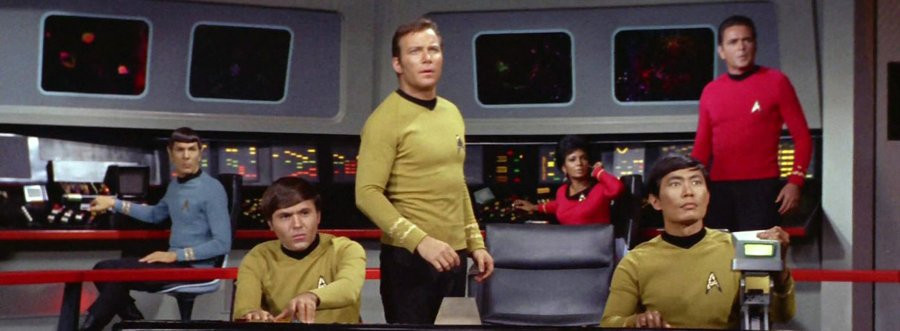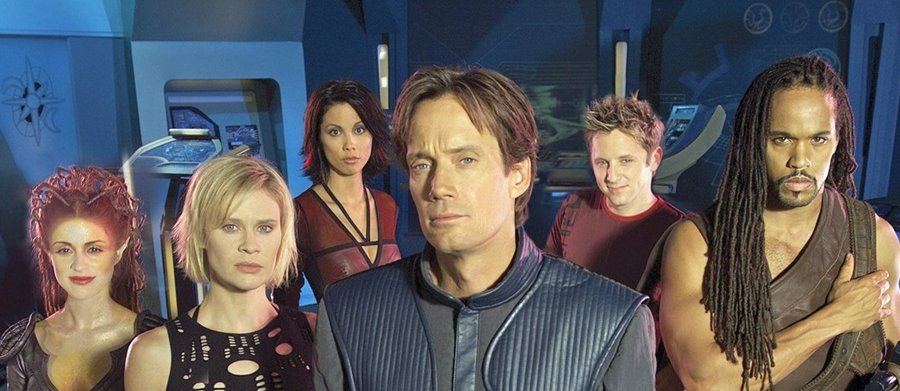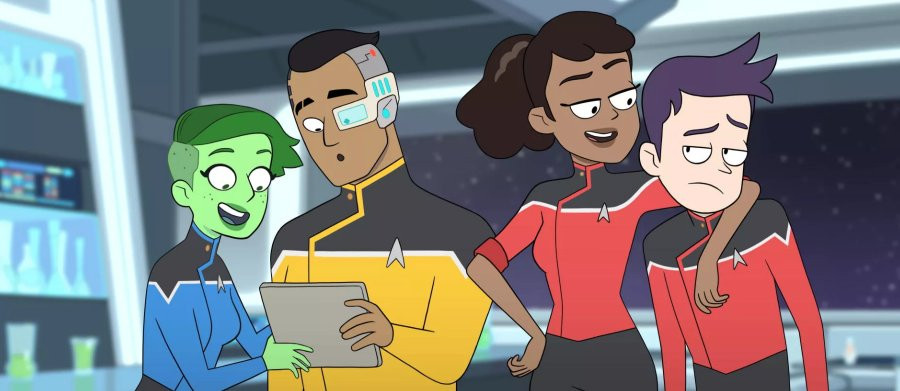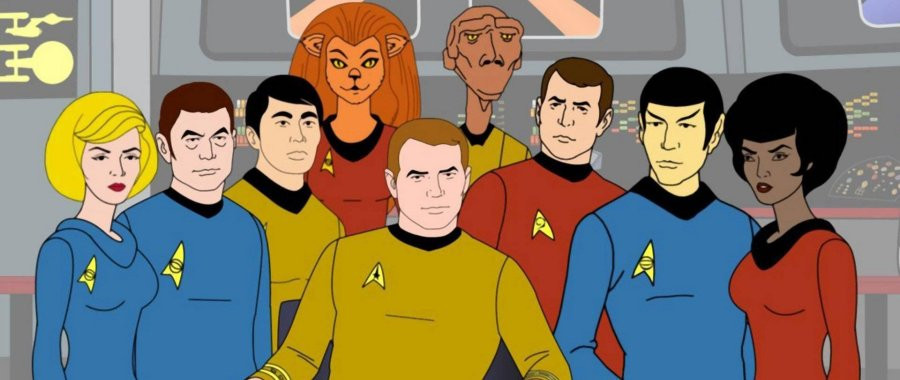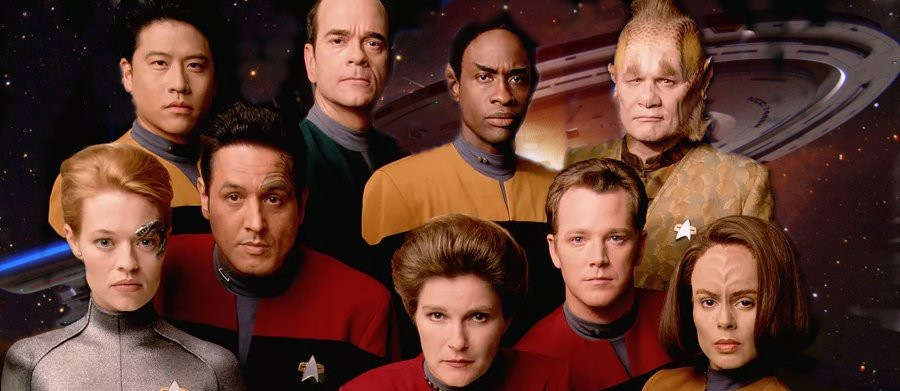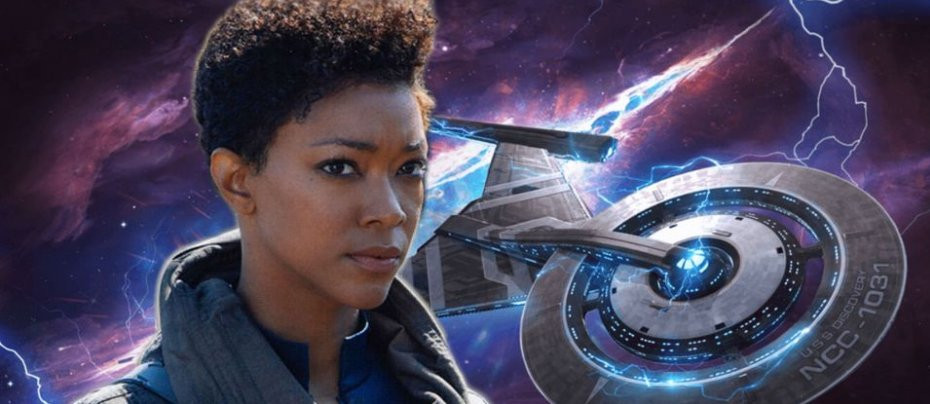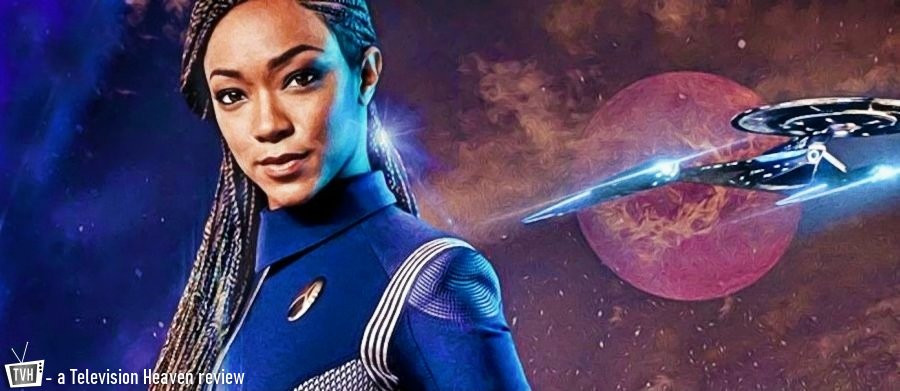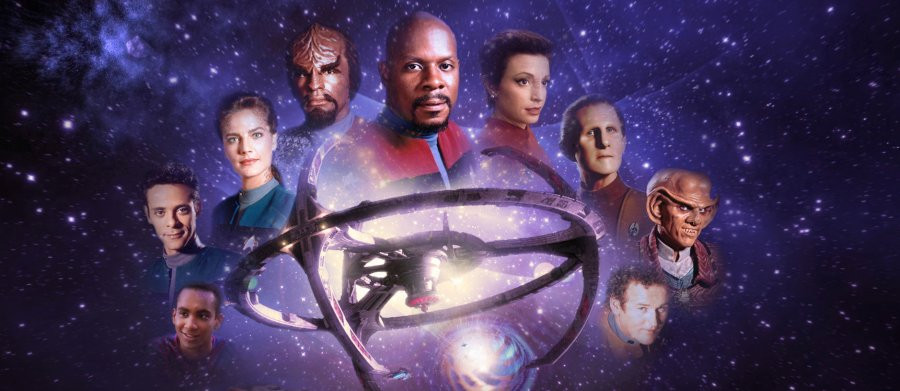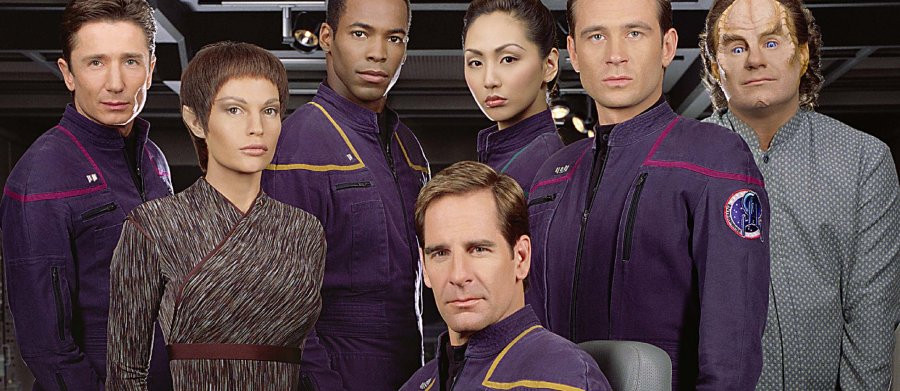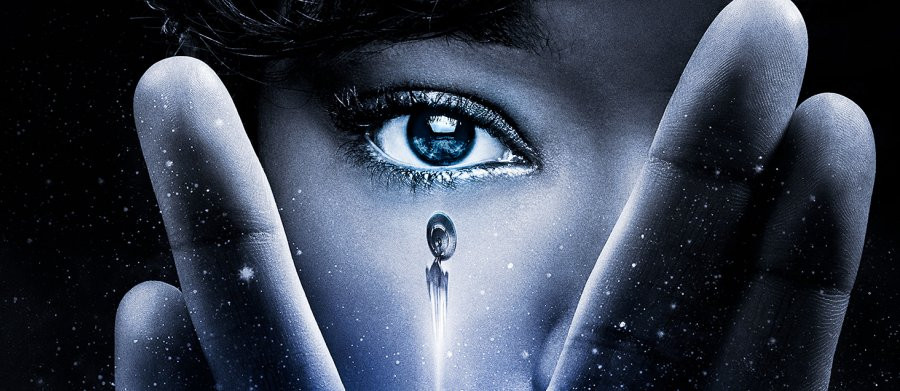
Star Trek: Discovery - Seasons 1&2
Review by Daniel Tessier
WARNING: SPOILERS AHEAD
Following the cancellation of Star Trek: Enterprise in 2005, the Star Trek franchise was adrift. After over seven hundred episodes and ten films, Star Trek had become predictable, a genre into itself, and while its core fanbase was dedicated, it had been losing mainstream appeal for years. This changed in 2009, when J.J. Abrams released his reboot movie, titled simply Star Trek, to major popular and critical success. The film gave the Trek franchise a much-needed kick up the warp core, reinventing it for the 21st century.
With two more films released over the next few years, the newfound success of Star Trek on the big screen made it inevitable that it would return to its original home on television. Hot on the heels of the original Star Trek's fiftieth anniversary, Star Trek: Discovery made its debut in 2017 on the online streaming service CBS All Access, becoming a headline show for the site in the same way Star Trek: Voyager had headlined its own network in the nineties. Purchased by Netflix for worldwide distribution, Discovery was designed as a version of Star Trek for the binge-watching generation. Serialised storytelling that encourages long watching sessions sets Discovery apart from earlier iterations of the franchise which were more episodic in nature, although Discovery's episodes were still released weekly.
The original concept for the series was an anthology format, inspired by American Horror Story, which began a new setting with new characters each season. Bryan Singer ( Dead Like Me, Wonderfalls, Hannibal), who had previously worked on both Voyager and Deep Space Nine , was chosen as showrunner with an idea for each season to take place at a different point in Trek's future history. In the event, this idea was dropped, but its influence can be felt on how Discovery has evolved and the subsequent array of new Trek series. Alex Kurtzmann, once half of the writing team for 2009's Star Trek and its sequel Star Trek Into Darkness, was brought on to create the series concept with Fuller, with Nicholas Meyer (writer and director of the hugely popular Star Trek II: The Wrath of Khan and Star Trek VI: The Undiscovered Country) recruited as a consulting producer. The new series was starting with a creative team of excellent pedigree.
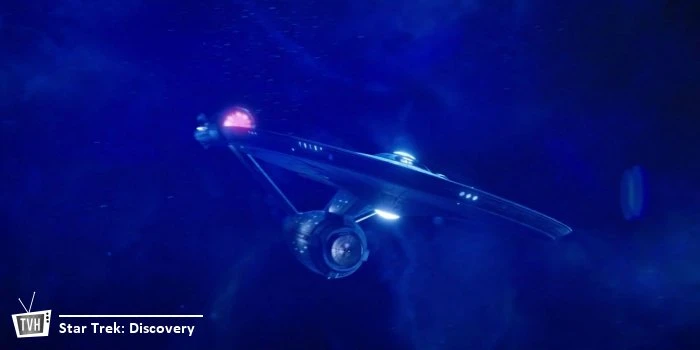
In time, Fuller would leave the series to focus on his work on American Gods, but his influence on the series' direction would be felt by the further writers brought on as co-showrunners, Aaron Harberts and Gretchen Berg, and executive producer Akiva Goldsman. It was decided that the new series would be another prequel to the original series, an approach that had worked well for the reboot movies. The first season of Discovery is set a century after Enterpriseand ten years before the original Star Trek, an era that had previously been almost unseen on screen. As such, it was a prime opportunity to both riff on established continuity and set up new and interesting storylines.
The name Discovery is one that fits particularly well with Trek, of course. The primary starship of the series, the USS Discovery, shares its name with the third NASA Space Shuttle, the Discovery OV-103, as well as the spacecraft from the groundbreaking film 2001: A Space Odyssey, the USSC Discovery One. The Starship Discovery's registration, NCC-1031 has a fun significance – it's the date of Hallowe'en in American format, Fuller's favourite holiday.
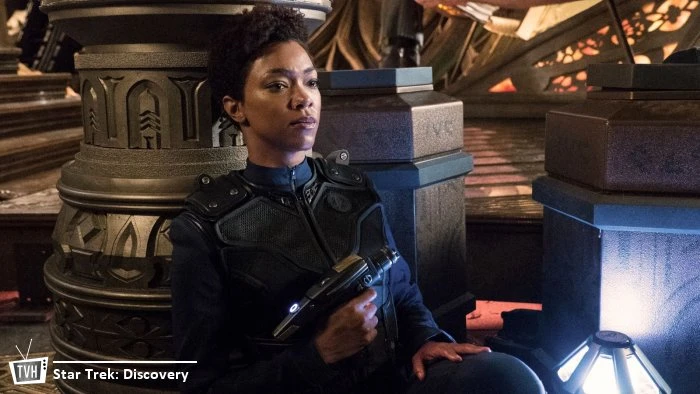
Very much setting it apart from previous series is its lead character. While Trek has always followed an ensemble format, each series and film was chiefly centred around the commanding officer. Discovery is different, focusing on Michael Burnham, a young woman with an unusual background. Played by Sonequa Martin-Green ( The Walking Dead, Once Upon a Time, The Good Wife ), Burnham happens to be the adopted sister of Spock, a character who had never previously been hinted at. Burnham grew up with scientist parents who were killed by Klingon raiders, giving her a long-standing mistrust of the warlike aliens. Taken in by Sarek, the Vulcan Ambassador, she grew up on the planet Vulcan alongside Spock, learning a more Vulcan way of life than probably any human before her. Martin-Green gives a remarkable performance as Burnham, possessing a poise and restraint unusual for even Trek's human characters, but hinting at great passion and will beneath. She imbues the character with a great deal of charm, and it's not difficult to see why she was chosen to headline the series.
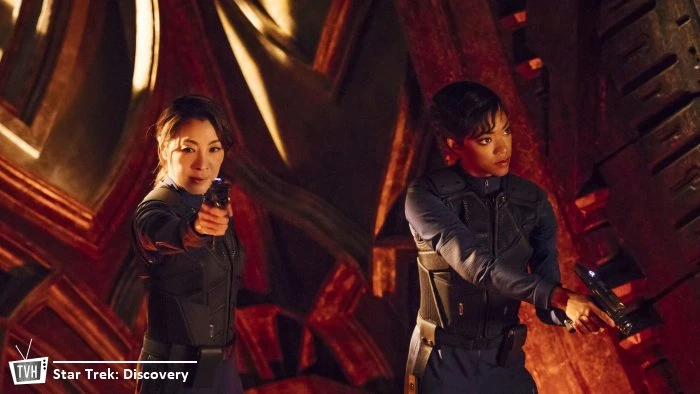
At the beginning of the series, in its two-part opening story, Burnham is the first officer on the USS Shenzhou under Captain Philippa Georgiou. Finding themselves in a confrontation with a huge Klingon ship, Burnham decides the best course of action is to fire on the Klingons first – a "Vulcan hello," as she calls it, referring to the Vulcans' own first contact with the Klingons where they only gained their respect by engaging them in battle. Turning against her captain and mentor, Burnham seizes control of the ship, firing on the Klingons and leading to the near destruction and total abandonment of the Shenzhou.
In an impressive bit of casting, Georgiou is played by film star Michelle Yeoh ( Tomorrow Never Dies; Crouching Tiger, Hidden Dragon), who plays the captain as a reserved and refined figure. It's all the more shocking then when the series kills off its big star in the opening story. Burnham is utterly lost, and is charged with mutiny, stripped of her rank and sentenced to life in prison. She's also blamed for starting a new war with the Klingon Empire – undeservedly, as the Klingon faction encountered was planning to attack the Federation in any case – and is left a pariah. It's one hell of a series opener.
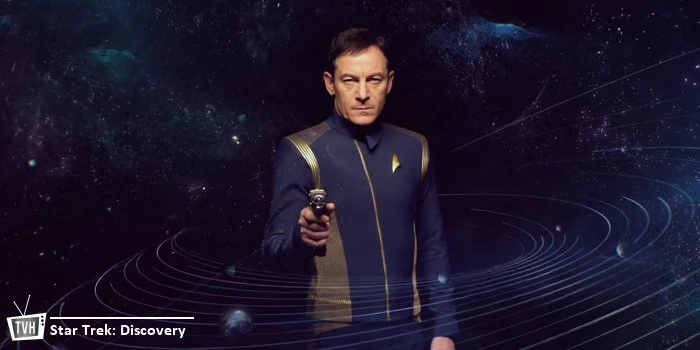
The first season deals with the devastating war with the Klingons. The USS Discovery and its crew aren't introduced until the third episode. In another impressive big name casting coup, Captain Gabriel Lorca is played by Jason Isaacs ( The OA, The State Within, the Harry Potter film series, among others), giving him a broad southern American accent for reasons best known to himself. Isaacs is a huge fan of the original Star Trek, and was initially reluctant to take place in a spin-off series fearing it would be a poor competitor, eventually being talked round by the strength of the character writing. Lorca is a damaged, aggressive captain, but one who holds the respect of his crew, and is hiding more than a few secrets. With the Federation losing the war and Discovery's experimental systems the potential key to turning the tide, Lorca reinstates Burnham into Starfleet as an observer, hoping she will give the ship the edge in facing the Klingons and handling the experimental technology onboard.
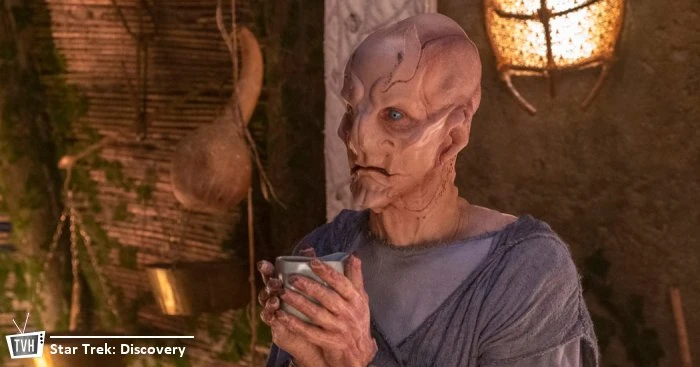
The remaining crew is a strange mixture of characters. Doug Jones, the noted creature actor seen behind layers of make-up and latex in Pan's Labyrinth, Hellboy and The Strain, plays Commander Saru. While the towering, skeletal Jones could probably pass for an alien anyway, he is once more encased in prosthetics to play a Kelpien, a member of a prey race from a planet of devastating predators. Perpetually in a state of fear, Saru's alien viewpoint provides the same kind of outsider role as Spock, Data or Seven of Nine, but often pits him against his more aggressive human crewmates. Jones gives an excellent performance, imbuing Saru with an uncanny locomotion and poise. He and Burnham share a confrontational past from the Shenzhou, and this makes her time on Discovery even harder.
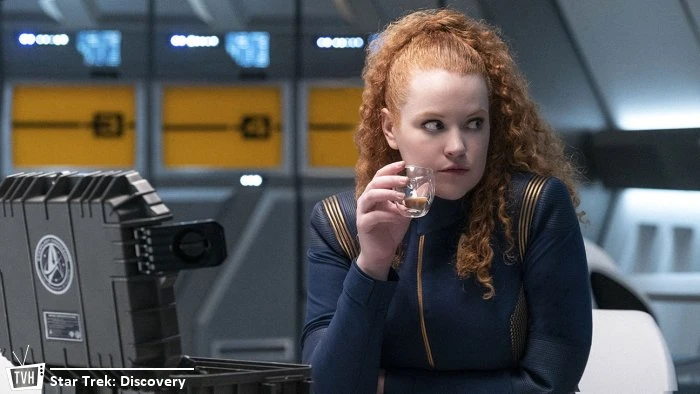
Mary Wiseman plays Cadet Sylvia Tilly, an enthusiastic and sometimes hard-to-handle young officer who's determined to make the best of herself. Tilly never stops talking and is probably on the autistic spectrum, but her unbridled passion for science and quick thinking shows her potential. She's not the ideal cabin mate for the reserved Burnham, but they develop a fast friendship. Actor and singer Anthony Rapp plays Dr. Paul Stamets, an astromycologist of all things (that's a space fungus expert). While this might not seem terribly essential, Discovery is equipped with an experimental "spore drive" which allows it to travel vast distances rapidly through a cosmic web of mycelium, which might be the most out-there idea Trek has done in a while. His husband, Dr Hugh Culber (Wilson Cruz, My So-Called Life) is a senior medical officer on the ship, and the contrast between the highly intelligent but often difficult Stamets and the good-natured Culber makes for an interesting dynamic.
British actor Shazad Latif (Spooks, Penny Dreadful, Toast of London) has a dual role as Ash Tyler, a security officer who is recruited onto the ship by Lorca when they meet in a Klingon prison, and Voq, a Klingon agent. Originally Voq was listed on the cast under a false name, in order to disguise the plot twist that the two characters were one and the same. Tyler is a character torn apart by his true nature and his imprinted personality, but also a noble man who strikes up an uneasy romance with Burnham.
The main cast of Discovery embraces diversity like no other iteration of the franchise. While ever since the original series Star Trek was noted for its diversity of cast, over the years it had fallen behind the times and had become perhaps one of the less diverse prime time dramas by the time of Enterprise. Discovery's cast includes the first African-American female lead for a Trek series, its first openly gay characters (who happen to be played by gay actors), and actors of various ethnicities both as regular, recurring and supporting characters. Dishearteningly, but predictably, many supposed fans of franchise were furious about this deliberate move for inclusivity, which makes you wonder whether they understood the franchise at all.
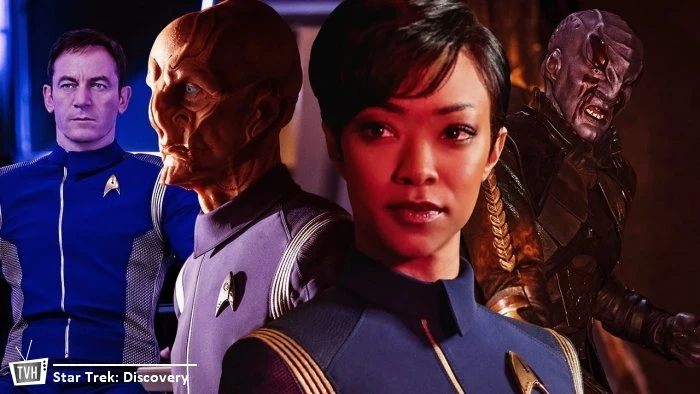
Being set in the lead up to the original series allowed the showrunners to include a number of elements of classic episodes, something which is both a blessing and a curse. To make the series look like the originals would be impossible, since the technology of the original Enterprise looks hopelessly archaic even by our own 21st century standards. Discovery redesigns almost everything from the starships to the uniforms, while keeping certain props and equipment as visual callbacks to the original. Classic characters are reimagined, with notable actors such as James Frain ( Gotham, True Blood, Orphan Black) and Rainn Wilson ( Six Feet Under, the US remake of The Office) as Ambassador Sarek and notorious criminal Harry Mudd respectively. From a continuity point-of-view, a prequel is a tricky beast, becoming either hopelessly predictable or clashing with established facts. The visual differences, combined with retcons such as Spock's sister, the devastating Klingon war and the miraculous spore drive upset a number of fans. For a broader audience, however, they remain true to essentials of the original Star Trek, albeit a darker, more cynical interpretation.
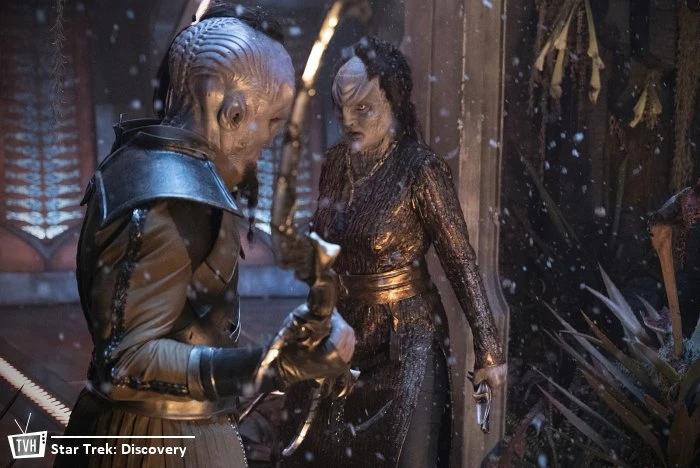
Perhaps the most spoken about issue for fans is the revamped Klingons, who were redesigned at Fuller's request to become more alien than ever before. With heavy prosthetics, allegedly monstrous anatomy and bald, elongated skulls, they appear very different to the Klingons familiar to viewers of Star Trek: The Next Generation and its spin-offs. Yet, those Klingons looked wholly different to the very human-like ones seen in the original series. Indeed, the Klingons have varied in appearance so much over the years that there's really no single way for a Klingon to be. For casual viewers the new Klingons simply look like a cool alien race, although the decision to kick off the series with an extended scene of them speaking in their incomprehensible language, complete with lengthy subtitles, was probably too alienating for many. This is a shame, since many of the actors behind the Klingons give excellent performances, especially the recurring actor Mary Chieffo as the noble and complex L'Rell.
While the Klingon war is the crux of the first season, there's time for some standalone adventures, the most entertaining being the Harry Mudd-centred time travel caper "Magic to Make the Sanest Man Go Mad." The series was split into two chapters for initial availability (somewhat damaging the idea of a binge-worthy series), with the first nine episodes airing in 2017 and the next six early the following year. The second chapter involved a lengthy excursion to the Mirror Universe – a savage parallel timeline first seen in the classic series episode " Mirror, Mirror " and revisited in Deep Space Nine and Enterprise. This allowed Michelle Yeoh to return as the despotic parallel version of her character, and the star clearly enjoyed hamming it up in the villainous role.
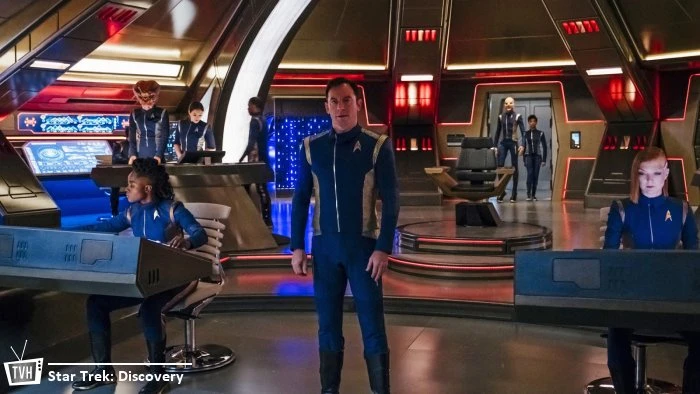
The first season saw the optimistic future of Star Trek pushed to the brink by warfare, with characters betraying their principles as they sought for victory. However, Burnham's development through the series saw her rediscover her own strength of character and helped push the other characters in the right direction, ending the season on a hopeful note. The final scene of the season promised a treat for fans, as the USS Enterprise itself – redsigned for a more modern look, but in keeping with the classic starship – appeared requesting help.
After some disruption behind the scenes caused delays, leading to Kurtzmann both leaving and returning and most of the remaining high-level creative staff being removed, the second season of Discovery was released beginning in January 2019, with Kurtzmann as sole showrunner and Goldsman in the slightly more hands-on position of Consulting Producer. The unrest on the creative front led to a different direction for the second season, with fan concerns about how Discovery fit with the rest of the franchise clearly influencing the storyline. Season two is a more upbeat affair, albeit still not as proudly optimistic as the original series, and delves into the background of the original Star Trek with gusto.
Back when Gene Roddenberry first pitched Star Trek, a pilot episode was made starring Jeffrey Hunter as Captain Christopher Pike, leading the Starship Enterprise and a crew that included Mr. Spock and the mysterious first officer known only as Number One. This was scrapped in favour of the cast and format that became a hit, but was incorporated into the series' backstory, with the footage reused to depict Spock's time with the previous captain of the ship, around a decade earlier. Attentive readers will note that this puts the original pilot episode, "The Cage," in the time just prior to Discovery.
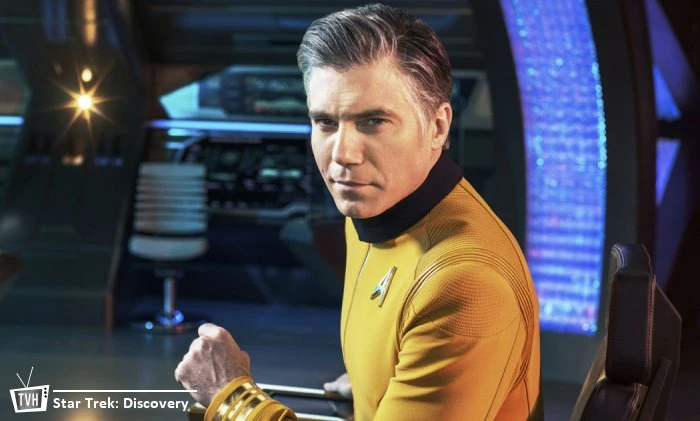
Following the Enterprise's rendezvous with Discovery, Captain Pike was placed in temporary command of the eponymous starship for the duration of the season. The expected reunion between Burnham and Spock had to wait, however, as the Vulcan officer proved to be missing. The search for Spock was the mission for the first part of the season, tied in with a series of mysteries that stretched across the galaxy. Spock was revealed to be on the trail of a cosmic figure he called the Red Angel, whose appearances across space and time were intrinsically linked to him and Burnham. All this became rather messianic, and Burnham's growing self-assuredness (crossing frequently into arrogance) was well-deserved as the entire universe does seem to revolve around her and her family.
Alongside this was a time travel narrative that saw a deadly artificial intelligence from far in the future acting to ensure its creation in the "present" of Discovery. Meanwhile, further ructions within the Klingon Empire (with the Klingon design tweaked to appease fans) and the involvement of Section 31 (Starfleet's intelligence service and dirty tricks department, originally created for Deep Space Nine ) complicated matters further. Among all this galactic conflict, there was also rather more actual discovery than in the first season, with the crew travelling to more new worlds and encountering more new aliens than before, the series finally living up to its name.
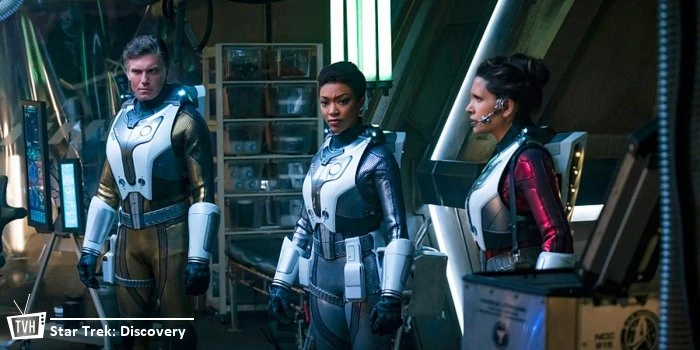
The majority of the characters returned from the first season, even some of those who hadn't quite survived that story (sci-fi is like that). Notably, both Yeoh and Latif returned as the Mirror Georgiou and Tyler/Voq, now in the employ of Section 31. The regular characters came into their own, loosening up a little now off the war footing but still dealing with their own crises. Saru received major development as he moved to another stage of his life cycle, prompting Discovery to travel to his home planet and giving Jones new aspects of the character to explore. New recurring characters were introduced to create new dynamics, including actor and comedian Tig Notaro as blunt engineer Jett Reno, and Alan van Sprang ( The Tudors, Shadowhunters) as Section 31 agent Leland.
For all this, though, the most popular characters with fans new and old were those from the original series. Anson Mount ( Hell on Wheels, Marvel's Inhumans) makes a charming, rugged and inspiring Captain Pike, the captain that the ship needs. Spock, once he turns up, is played by Ethan Peck – grandson of the legendary Gregory Peck – a very talented yong actor who brings new dimensions to the beloved character. His deteriorating mental health, complex relationship with his father and sister, and his disillusionment with Starfleet make a deep character even more complex. Along with Pike and Spock, Number One returns, now played by Rebecca Romijn ( Ugly Betty, X-Men) although she's mostly busy on the Enterprise.
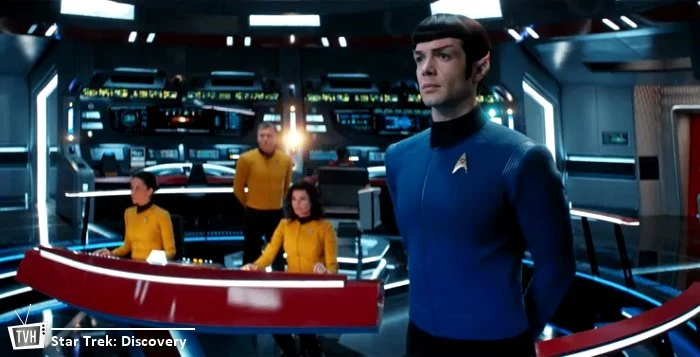
Season two of Discovery manages to balance the high stakes, deadly threats of the first season with a fair bit more fun and optimism. Nonetheless, the series remains a bleaker vision of the future than Trek is best known for. Still, in today's world, where a bright future looks less likely than ever, showing that such a future must be fought for is worthwhile. The future of Discovery isn't the future of the original Star Trekand even less that of The Next Generation , but the characters are fighting to create that future.
Discovery's second season ends with a clear decision to divorce it from its tricky position as a prequel. Burnham and her crew are forced to take the ship through time and space, travelling over nine hundred years further into the future – where Star Trek has never gone before. The third season, due later this year, will see the series set in a wholly new future era where some real discovery can take place. Meanwhile, Discovery's legacy may prove to be the dynamic return to television of the Star Trek franchise. The series' direct spin-offs include Star Trek: Short Treks, an experimental series of mini-episodes that largely support Discovery's story and characters; Star Trek: Strange New Worlds, the new adventures of Pike, Spock and Number One on the Enterprise, coming soon because the fans demanded it; and a proposed Section 31 series designed as a vehicle for Michelle Yeoh. Less directly, the success of Discovery led to the creation of Star Trek: Picard , the brand new animated comedy series Star Trek: Lower Decks and the upcoming animated children's series Star Trek: Prodigy. While Discovery might not be everyone's idea of Star Trek, it's proven to be the spark that has reignited the engine of the franchise.
Daniel Tessier
Dan describes himself as a geek. Skinny white guy. Older than he looks. Younger than he feels. Reads, watches, plays and writes. Has been compared to the third, fourth, fifth, sixth, seventh, eighth, tenth, eleventh and twelfth Doctors, and the Dream Lord. Plus Dr. Smith from 'Lost in Space.' He has also had a short story published in Master Pieces: Misadventures in Space and Time a charity anthology about the renegade Time Lord.
Dan's web page can be here: Immaterial
Published on September 10th, 2020. Written by Daniel Tessier for Television Heaven.


